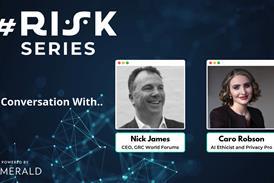ESG, the supply chain, and risk management are converging.

“Simple decisions can have ramifications,” says Grant Griffiths, Risk and ESG specialist and global ambassador for the Institute of Risk Management.
He takes as an example P&O.
When the company made its controversial decision to fire/make redundant workers, announced by video call, a range of issues came into focus, which he lumps under the heading’ risk management.’
“First, there was the legal risk,” he says. Did the company follow proper legal requirements? In fact, the company admits that the move might not have been legal. Chief Executive Peter Hebblethwaite said: “There’s absolutely no doubt we were required to consult with the unions. We chose not to do that.”
But the company clearly believes that the risk implicit in not following legal requirements was outweighed by the financial risk of not taking that action.
But setting aside the legality of the matter, there are other issues related to the P&O move, and they highlight how ESG and risk management converge.
“What was their plan,” asked Griffiths? Answer: “to hirer lower-cost workers.” But then that “leads to the risk that the replacement workers may be neither equipped nor qualified to take over.”
Then there is governance. “The board is put in place to look after the long term interests of the company.” Grant points out that the UK Companies Act states that directors must act in the company’s best interests and “not any individual shareholder or stakeholder.
“They need to ensure the long term sustainable performance of the company.”
Sustainable versus sustainability
There is a side issue here.
The ‘E’ in ESG relates to sustainability. But a sustainable business is a company that generates sufficient revenue to continue operations. Of course, it is often argued that ESG is essential for a company to be sustainable in the long run; so, in a sense, sustainability creates sustainable.
Is P&O more or less sustainable now?
Reputation damage
P&O has suffered a reputational hit. But then, this is a key part of the rationale for ESG.
But it is rarely simple. Grant cites Disney as an example. It could be losing customers over its LGBT stance, but whether it is because it is too LGBT friendly or anti-LGBT is not so clear.
The controversy relates to a new regulation in Florida designed to restrict the teaching about sexual orientation and gender identity.
Disney, which plays a crucial role in the Florida economy, was first heavily criticised for not vocally opposing the deal, leading to social media discussions boycotting its products. Its boss Bob Chapek apologised and said he had lobbied against the bill in private.
Now the state of Florida has responded with a new bill to remove Disney’s special status on a 40 square mile area of land.
It boils down to risk management. Disney is trying to support its reputation whilst simultaneously trying to avoid conflict with regulators. Simple, it is not.
Convergence
Grant Griffiths explained that ESG and risk management in combination are complex enough; add supply chain to the equation, and an enormously complex world is revealed.
Supply chain and Ukraine crisis
ESG has come under some criticism for not reacting more vigorously to the Ukraine crisis.
But for Grant, once again, it boils down to the convergence of ESG and risk and supply chain management.
And now, of course, supply chain concerns relating to the Ukraine crisis are everywhere. Setting wheat, oil and gas (the obvious examples) aside, we are learning about the importance of Russia in fertiliser supply and in platinum-based metals, which are important, for example, in catalytic converters.
Not many people previously understood the importance of Ukraine to the supply of neon, for example.
Grant says that this is not just disruption, it is a dislocation event.
Risk management in combination with ESG should have shone light on supply chain vulnerabilities in advance, and help organisations manage risk more effectively.
ESG World Forum
Part of the Digital Trust Europe Series
ESG World Forum is a two-day, in-person event taking place as part of the Digital Trust Europe series. 2021 was widely considered “the year of ESG investing.” Given the importance society has placed on ESG issues following COP26, we are likely to see this growth trend continue throughout 2022.
ESG World Forum will bring together a range of leading ESG experts and executive speakers from a range of industries as every major company is considering ESG strategies.
FIND OUT MORE ABOUT ESG WORLD FORUM
























No comments yet